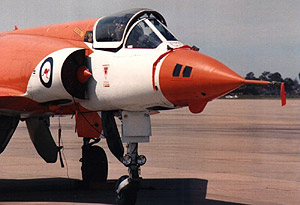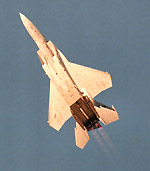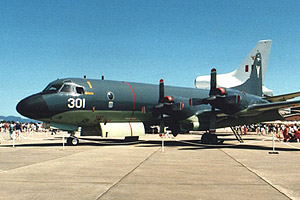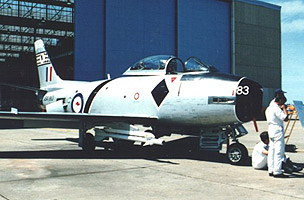Home | Airshows | The Hangar | Nostalgia | Links
 |
|
Mirage
IIIO A3-2 of ARDU, painted in the distinctive 'Fanta can' test colours
of Orange and White. The nose is modified for the carriage of cameras
and test instruments. A3-2 is unusual as it never served on a front
line squadron, spending all its days on test duties.
|
Avant Avalon
Graham Mison remembers the Australian Bicentennial Air Show at Richmond in 1988, the precursor to today's Avalon series.
October 1988 - geez, that's over fifteen years ago. The thought crossed my mind recently as I looked over my photos of the Australian Bicentennial Air show. Other memories flooded in of a year and an event that had a big impact on Australian air shows and on how Australians saw themselves. Much has changed in those fifteen years, yet so much is still the same.
But back to the 'show itself. The lineage of the ABAS can be traced back to 1976 and an air show organised by the Schofields Flying Club at their field to raise funds to buy their first aircraft. This grew into the most popular event of its kind over the remainder of the '70s and into the '80s gaining huge support from the military and even international airlines such as British Airways and the USAF. Even before the 1985 event was run they were invited to apply their hard learnt organising skills towards the ABAS to be held at RAAF Richmond.
 |
|
F-15C
78-0536 of the 18th TFW, Kadena, climbs with full afterburner on.
The 'Shoguns' flew two Eagles down and displayed the other (78-0535)
on the ground.
|
Running from 12-16 October 1988 the show was billed as an aviation extravaganza, it would cover 'Yesterday, Today and Tomorrow' and it certainly lived up to that with aircraft from the UK, USA, Russia, NZ, Papua New Guinea and Norway as well as the full range of aviation in Australia. In the local press in the preceding months a constantly growing list of aircraft was mentioned as participants - at one stage every aircraft type in the US inventory was promised to appear, this reminding me of a saying my Father had: "Watch the Yanks, they'll promise you the world and then hand you an atlas." But we all loved the two F-15Cs , the KC-10, Galaxy and B-52 that did appear. There was only one thing we thought could ruin this event and that was the weather, but the organisers had the Gods smiling on them on that point. However an event on the other side of the World would cast a shadow all the way to Richmond - the horrific collision on 28 August at Ramstein between members of the Frecce Tricolori. A media frenzy followed down here with calls from some that the ABAS must be cancelled. Most in the mass media had no idea, or didn't want to know, that rules regarding air shows in Australia were different from Europe. Much effort by the organisers was put into calming this down and it must have worked as over 250,000 members of the public attended the show.
 |
|
This
is P-3C 301 of the Dutch Navy. Like many Richmond visitors it has
had a Kangaroo applied to its markings (at the top of the fin) -
zapping is an often practised trade in the Aussie military.
|
And what those people saw was regarded as one of the best international shows of the year - in fact Flight International declared it the best of the year. Why? For local aviation enthusiasts it was all those overseas types we'd never seen before and the numbers of our own services at an air display had never been this high since the RAAF's 60th at Amberley in '81.
For the General public it was one of the events that stood out from hundreds of others in a year full of celebration, the third of what some cynics on the Bicentennial board called the 'Big boys toys' events (the other two being the Army Tattoo and the Bicentennial Naval Salute) where 'the man in the street' was able to appreciate the skill and effort put in by his military and find out how well regarded they are through out the world. For the thousands of overseas visitors (over 9,000) and aviation professionals it was a chance to see a nation's air forces that, because of distance, are only glimpsed on rare occasions and to make those personnel connections we now call networking (and perhaps even close a sale or two).
|
Aussie
extras
|
 |
 |
 |
The first
three days were given over to trade and business dealings, BAE were there
in force with a two seat 100 series Hawk and a single seat 200, chasing
a deal for a Macchi replacement (which of course they would eventually
get a decade or so later) as well as the prototype of the ASTA BAE 146
Military transport. Over 400 Companies including 100 or so from overseas
had representatives at Richmond. Many conferences and gatherings were
timed to coincide with the show and many of these were no doubt used as
good excuses by company execs for a holiday 'Down Under'. But the military
also know a good thing and a number of exercises and show the flags were
organised, the RAF's 29 Squadron stopping over as part of their Golden
Eagle '88 circumnavigation of the globe, their Tornado F3s accompanied
by a TriStar tanker. We also had the pleasure of a couple of Nimrods,
a Dutch P-3C, and the Russians made their first appearance in Oz with
the mighty 'Ruslan' which brought with it a KA-32 and the incredibly agile
SU-26M as cargo.
 |
|
The
beautiful CA27 Mk32 Avon Sabre A94-983 of the RAAF Historical Flight,
in the markings of the 'Black Diamonds' aerobatic team of the '60s.
Restored to flight in 1981 she performed at many air shows until
the second half of the '90s when the RAAF grounded her. One of the
highlights of her display was a low, slow and dirty pass with the
canopy slid back and the pilot waving to the crowd.
|
The two public days had so many highlights it's still difficult to pick one thing above others, but here are a few that come to mind: the flying display by the An-124 Ruslan (it seemed that the laws of nature were suspended as this huge hulk of a plane was thrown around at low level); the F-15 that put on an impressive show of power, it being so good to finally see one put through it paces; but above all it was the six members of 'Kiwi Red' in their A-4s, their display being in a class all their own and having every set of eyes on them from the moment they appeared. Our mates from over the Tasman did themselves and their country proud, something Helen Clark and her Government wouldn't condone and would now term a waste of taxpayers' money. The vote for the loudest display would have to go to the Tornado F3 and who had the best manners? Why, the Sea Harrier of course, any aircraft that bows to the crowd at the end of its display is well thought of. Richmond was a combination of the best bits of the world's great air shows and the best parts of Australian culture, it had its 'wow' factor and it was friendly, laid back with business being a pleasure not a chore.
 |
|
The
six members of 'Kiwi Red'. Undoubtedly the stars of the show, they
were a cut above even our own 'Roulettes'. Gone for ever now as
the Clark Government has reduced the RNZAF to just an airline with
no fighters or attack aircraft.
|
Richmond was to be remembered for one other thing, it was the last public air display by the Mirage IIIO. The French Miracle was bowing out and two examples from ARDU made the trip from South Australia. We were treated to the sight and sound of a solo display by one of the most elegant aircraft types of the post war era for the last time - if only the RAAF had kept just one in flying condition. The Mirage's replacement, the F-18, was of course on hand and a staged turning comparison between the two was flown, no prizes for guessing the winner!
For those people who are into statistics here are a few: official attendance for the two public days was put at just over 250,000. Over 350 aircraft attended the show. Consumed were over 71,000 cans of beer (it was hot and dusty), 55,000 cans of soft drink, 35,000 hot dogs, over 600 kgs of beef, 440 kgs of prawns, 115 kgs of lobster, several truck loads of ice cream and too many pies and chips to count.
The legacy
of the ABAS lives on today in the biannual Avalon show. It may have moved
to another state but without the 'proof of concept' and the monetary kick
start from the profits from Richmond '88, Avalon could never have been.
Not bad for an idea that started with a club of only thirty members looking
for a way to raise money to buy their first aircraft in 1976. Just goes
to prove the saying 'From little acorns do mighty oaks grow.'
Home | Airshows | The Hangar | Nostalgia | Links